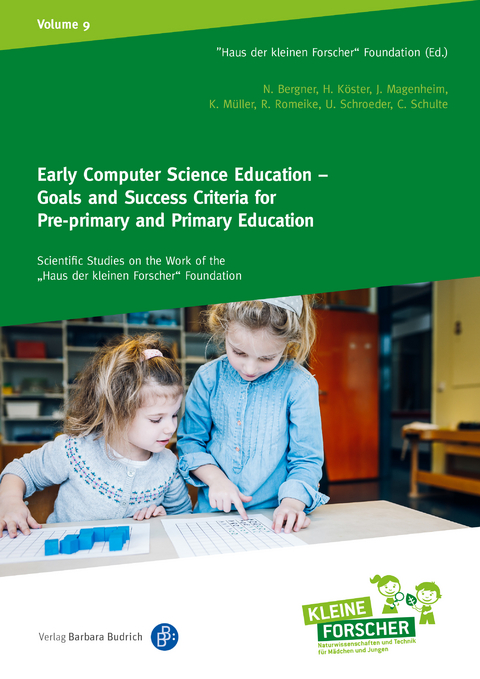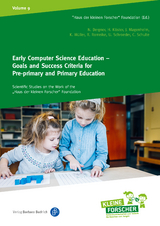Early Computer Science Education – Goals and Success Criteria for Pre-Primary and Primary Education
Verlag Barbara Budrich
978-3-8474-2646-2 (ISBN)
lt;b>The "Haus der kleinen Forscher" Foundation has been committed to improving the education of girls and boys of nursery and primary school age in the fields of mathematics, computer science, natural sciences and technology since 2006. Partners are the Helmholtz Association, Siemens Foundation, Dietmar Hopp Foundation and Deutsche Telekom Foundation, funded by the Federal Ministry of Education and Research. The foundation is based in Berlin, Germany.
About the Authors
Preface
Foreword (Ilan Chabay)
Introduction (“Haus der kleinen Forscher” Foundation)
1 Overview of the “Haus der kleinen Forscher” Foundation
2 Relevance of Early Computer Science Education
3 Professional Basis for the Subject Area of “Computer Science”
Summary of Key Findings (“Haus der kleinen Forscher” Foundation)
A Goal Dimensions of Computer Science Education at the Elementary and Primary Level (Nadine Bergner, Hilde Köster, Johannes Magenheim, Kathrin Müller, Ralf Romeike, Ulrik Schroeder, Carsten Schulte)
1 Potential of Computer Science Education
1.1 What is Computer Science?
1.2 Computer Science as a Science
1.3 Construction in Computer Science
1.4 Similarities and Differences in Computer Science in Comparison
1.5 Computer Science and Computer Science Education
1.6 The Relationship of Computer Science Education, Media Education & Digital Education
1.7 Conclusion: Computer Science Education for all
2 Foundation of Goals on the Children’s Level
2.1 Children in Digital Worlds
2.2 Foundations of Learning Psychology
2.3 Access to Computer Science for Children
2.4 International Comparison: Curricula and their Classification in the Competence Model
2.5 Placing the International Standards Within the Framework of a Competence Model for Computer Science Education at the Primary Level
2.6 Results/Conclusion
3 Goals at the Level of the Children
3.1 Overarching Basic Competencies
3.2 Motivation, Interest and Self-Efficacy of Computer Science
3.3 Computer Science Competencies of Children
3.4 Prioritisation of Specific Competence Expectations at the Level of the Children
4 Goals for Early Childhood Educators and Primary School Teachers
4.1 Motivation, Interest and Self-Efficacy
4.2 Attitudes, Approaches and Understanding of Roles
4.3 Computer Science Competencies
4.4 Computer Science Didactic Competencies
4.5 Key Competencies for Dealing With Digital Media
4.6 Conclusion/Recommendations
5 Examples of Prioritised Competence Domains for Computer Science Education
5.1 Examples of Early Computer Science Education
5.2 Summary Heat Map of Priority Setting in the Examples
6 Prerequisites for Successful Early Computer Science Education
6.1 General Conditions for Successful Implementation
6.2 Measuring Instruments to Determine the Prerequisites for Success
7 Conclusion
B Professional Recommendations for Informatics Systems (Nadine Bergner, Kathrin Müller)
1 Introduction
2 Overview of Possible Informatics Systems
3 Description and Technical Assessment of Individual Informatics Systems
3.1 Cubetto Robot from Primo Toys
3.2 Beebot from Terrapin
3.3 KIBO from KinderLab Robotics
3.4 Ozobot/Ozobit from Evollve Inc.
3.5 LEGO WeDo 2.0
3.6 Dash & Dot from Wonder Workshop
3.7 Scratch and ScratchJR
3.8 Makey Makey from JoyLabzLLC
3.9 LEGO Mindstorms (NXT & EV3)
3.10 Arduino Microcontroller with ArduBlock
4 Recommendations
5 Conclusion
Conclusion and Outlook – How the “Haus der kleinen Forscher” Foundation uses the findings (“Haus der kleinen Forscher” Foundation)
1 Recommendations from the Expert Reports as a Basis for the (further) Development of the Foundation’s Substantive Offerings
1.1 Motivation, Interest and Self-Efficacy when Dealing with Computer Science
1.2 Computer Science Process Domains
1.3 Computer Science Content Domains
1.4 Computer Science Didactic Competencies
1.5 Attitudes, Mindsets and Understanding of Roles with Regard to the Design of Computer Science Education
2 Digital Education – A Chance for Good Early STEM Education for Sustainable Development
3 Scientific Monitoring and Evaluation of the Professional Development Workshops
4 Outlook – Organisational Development in Educational Institutions
References
Appendix
Illustration Credits
“Haus der kleinen Forscher” Foundation
English Publications issued by the “Haus der kleinen Forscher” Foundation to date
| Erscheinungsdatum | 28.03.2023 |
|---|---|
| Reihe/Serie | Wissenschaftliche Untersuchungen zur Arbeit der Stiftung „Haus der kleinen Forscher“ ; 9 |
| Vorwort | Ilan Chabay |
| Verlagsort | Leverkusen-Opladen |
| Sprache | englisch |
| Maße | 170 x 240 mm |
| Gewicht | 835 g |
| Themenwelt | Sozialwissenschaften ► Pädagogik ► Sozialpädagogik |
| Sozialwissenschaften ► Pädagogik ► Vorschulpädagogik | |
| Schlagworte | Early childhood education • Elementar- und Primarbereich • Frühe Bildung • Informatische Bildung • MINT-Bildung • professional development • stem |
| ISBN-10 | 3-8474-2646-X / 384742646X |
| ISBN-13 | 978-3-8474-2646-2 / 9783847426462 |
| Zustand | Neuware |
| Informationen gemäß Produktsicherheitsverordnung (GPSR) | |
| Haben Sie eine Frage zum Produkt? |
aus dem Bereich




